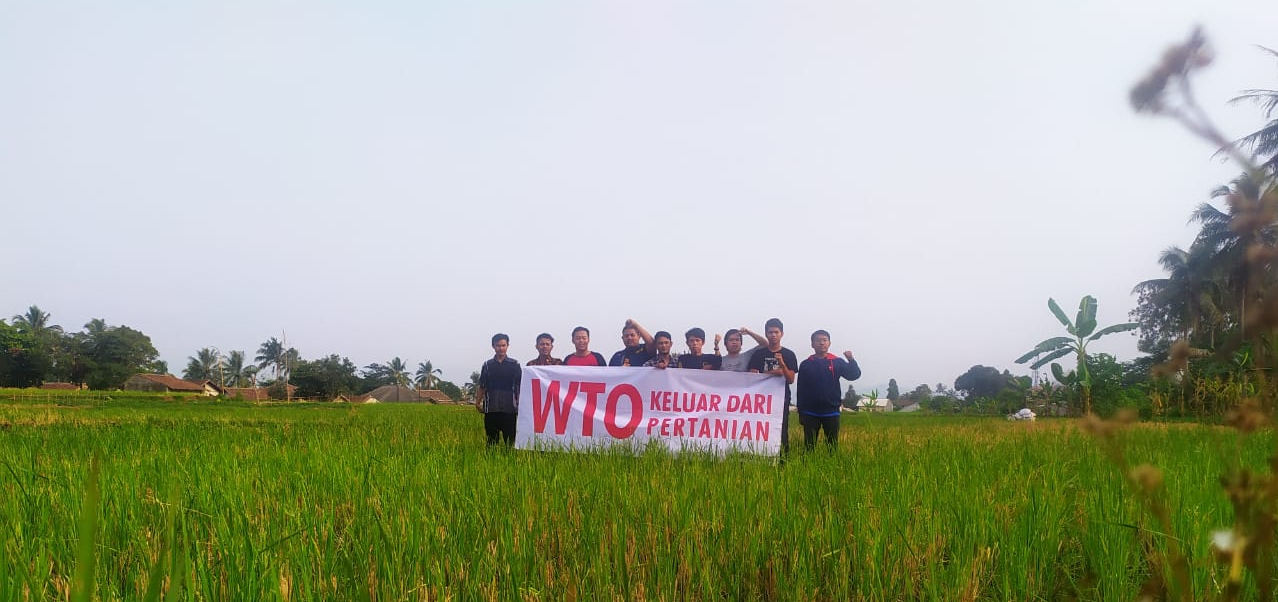“WTO and FTAs out of Agriculture”, Indonesian Peasants reiterate their demand through demonstrations across the country

Young Peasants of Serikat Petani Indonesia (SPI) organised several demonstrations and activities across the country last week to highlight the destructive neo-liberal policies of the World Trade Organisation and other Free Trade Agreements (FTAs).
In a press note released on 10th September 2019, SPI insisted that guaranteeing food sovereignty is a solution to address food and agriculture problems in Indonesia. The Union points out that this was realized by the Indonesian government by legalizing a number of regulations aimed at protecting peasants, such as: Law Number 18 of 2012 Concerning Food, Law Number 19 of 2013 concerning Protection and Empowerment of Farmers. The Government of Indonesia had also committed to bring about food sovereignty, starting with an agrarian reform to redistribute 9 million hectares of land to peasants and 12.7 million hectares for social forestry. This is also listed in the 2015-2019 National Mid-Term Development Plan (RPJMN) of the country.
However, according to Henry Saragih the Chairperson of SPI, all these good efforts are constantly challenged by the World Trade Organization (WTO) and other forms of free trade agreements.
“The WTO coerces the Indonesian government to amend regulations in the agriculture and food sectors that are deemed incompatible with the free trade regime and the interests of industrialized countries. This can be seen from the lawsuit filed against the Indonesian government in the WTO related to several cases, such as: the lawsuit of the United States and New Zealand on the Indonesian government’s policy of trying to protect food products of peasants and small fishermen.”, he said in Jakarta on the 10th of September while commemorating the International Day of Action Against WTO and FTAs.
WTO’s unwarranted meddling in the agricultural policies of member states has not only damaged the sovereignty of small farmers in Indonesia, but also small farmers in other parts of the world. Since its founding in 1995, WTO’s efforts to encourage deregulation, global capital expansion in the agricultural sector, and free trade have been a threat to efforts to uphold food sovereignty in a country.
As an International Peasant Movement, La Via Campesina, for more than 20 years has been organizing the struggle against the WTO and the practices of agricultural liberalization and free trade in the world. La Via Campesina had mobilized actions at almost all WTO Ministerial Conferences (KTM), since Seattle (1999), Cancún (2003), Hong Kong (2005), Bali (2013) and Nairobi (2015).
One of the important moments related to peasant resistance against the WTO was the martyrdom of Lee Kyung Hae, a South Korean farmer, , on September 10, 2003. This event took place in the midst of protests from farmers addressing the WTO Ministerial Meeting in Cancun, Mexico. Lee Kyung Hae’s action to end his life presented the frustration of small farmers who are victims of the unfair trade carried out by the WTO.
Saragih also added “In the midst of the increasing dominance of free trade agreements in the agricultural sector at present, peasants have a new hope to get out of this situation. After 17 years of struggle at various levels, on December 17, 2018, a United Nations Declaration on the Rights of Peasants and Other People Working in Rural Areas (UNDROP) was born. This declaration is an international legal instrument that aims to protect the rights of peasants and rural communities throughout the world, such as peasant’s right to land, water, seeds, and other agrarian resources. This declaration can be a tool for the struggle for peasants to resist the current WTO dominance.”
Responding to La Via Campesina’s call to mobilise against WTO’s and FTAs, the youth wing of Serikat Petani Indonesia organised demonstrations in several parts of the country. Here are some of them.
